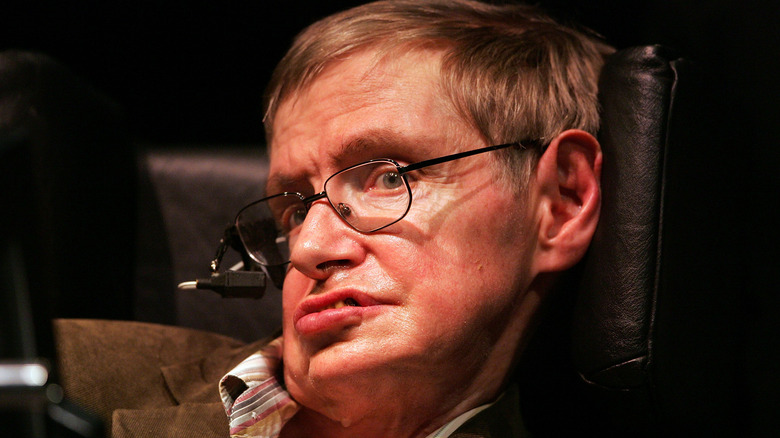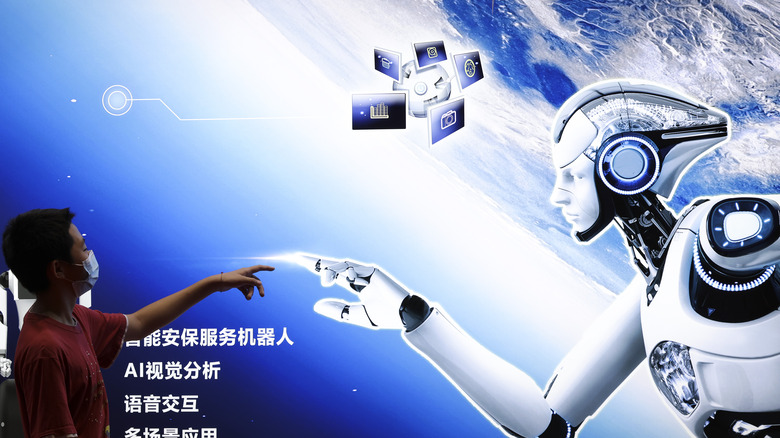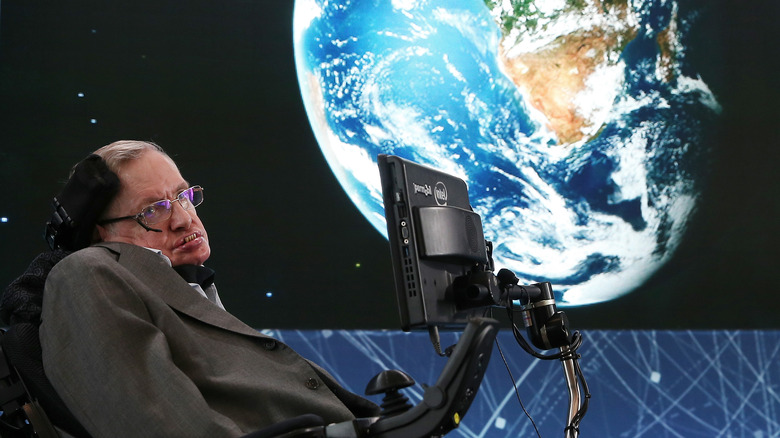The Scientific Progress That Stephen Hawking Never Stopped Warning Us About
Few scientists have had as much mainstream appeal as physicist Stephen Hawking. According to Biography, From 1979 to 2009, he was the Lucasian Professor of Mathematics at the University of Cambridge, generally regarded to be one of the most distinguished academic roles in the world. Though he had ALS -– amyotrophic lateral sclerosis –- that ultimately left him paralyzed, requiring the use of a wheelchair and a speech-generating device, Hawking never stopped educating the masses about the universe and our place in it.
While Hawking's impressive academic career is more than enough to secure his place in the history of science, he also managed to become a bit of a pop culture icon. According to History, he established a Guinness World Record when his 1988 book, "A Brief History of Time," remained on the Sunday Times best-seller list for more than four years. Hawking would achieve even more mainstream appeal over the years with appearances on such television programs as "The Simpsons," "Star Trek," and "The Big Bang Theory," as well as when he was portrayed by Eddie Redmayne in the Academy Award-winning portrayal in "The Theory of Everything" (per Biography). He died on March 14, 2018, but he will forever be remembered by scientists and non-scientists.
Stephen Hawking's fears about artificial intellegence
While Stephen Hawking was a proponent of using technology to maintain the perpetuation of the human race, he also believed that technology, if advanced far enough, could also pose a major threat to humanity. Specifically, Hawking was worried about A.I., artificial intelligence, and had been sounding the alarm about its potential danger for some time, like when he gave a talk at Centre for the Future of Intelligence at Cambridge University in 2014, saying "In the future, A.I. could develop a will of its own — a will that is in conflict with ours. The rise of powerful A.I. will be either the best or the worst thing ever to happen to humanity. We do not yet know which."
Of course, this wasn't the only time that Hawking warned us about the risks of developing A.I.; according to CNBC, Hawking appeared at the Web Summit technology conference in Lisbon, Portugal in 2017, where he said, "success in creating effective A.I., could be the biggest event in the history of our civilization. Or the worst. We just don't know. So we cannot know if we will be infinitely helped by A.I., or ignored by it and side-lined, or conceivably destroyed by it."
Stephen Hawking and others' cautious optimism
While Stephen Hawking had his concerns about the possible jeopardy that humanity faces should A.I. become too advanced, he still maintained some restrained confidence in our collective ability to prevent A.I. from overtaking us. As per CNBC, Hawking stated at the 2017 Web Summit technology conference in Lisbon, "I am an optimist and I believe that we can create AI for the good of the world. That it can work in harmony with us. We simply need to be aware of the dangers, identify them, employ the best possible practice and management, and prepare for its consequences well in advance." He pointed to some of the legislative efforts being present throughout Europe at the time to define restrictions on the capabilities of A.I. and advanced robotics as proof of the possible positive direction that we may be going in.
As stated in CNBC, Hawking wasn't the only prominent voice in the fields of science and tech to address how to deal with A.I. For example, Tesla and SpaceX CEO/founder Elon Musk has put forth the idea of humans merging with technology to hold on to their place in the world, Microsoft founder Bill Gates proposed imposing an income tax on advanced robotics to keep them in check, while Facebook founder/CEO Mark Zuckerberg believes we have little reason to fear A.I.'s continued evolution.


